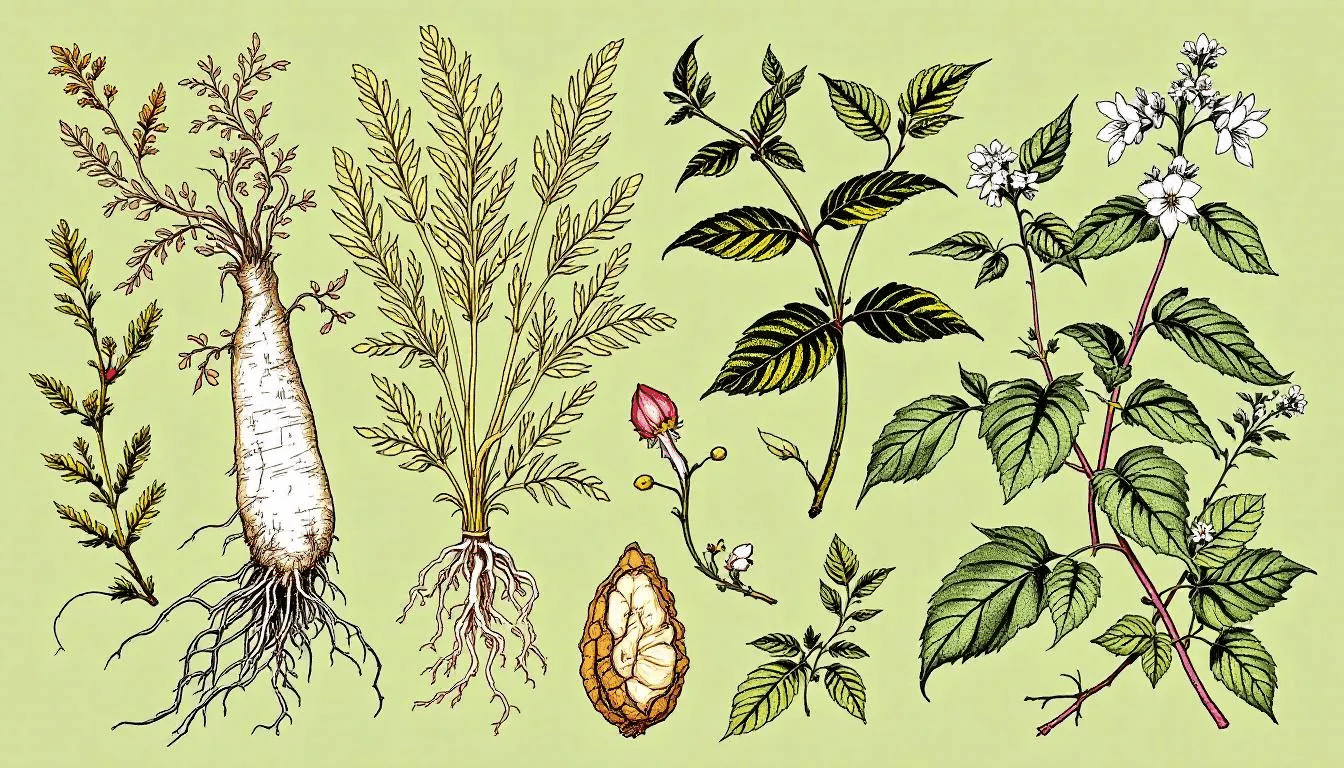
Top Tonic Herbs List: Boost Your Well-being Naturally
Curious about which tonic herbs can support your health the best? This tonic herbs list introduces you to top herbs known for enhancing well-being. You’ll find out how these herbs benefit your body and how you can incorporate them into your daily routine for long-lasting health.
Key Takeaways
- Tonic herbs are designed for long-term use, providing gradual support for health and wellness by enhancing immunity, managing stress, and balancing bodily functions.
- Examples of prominent tonic herbs include Holy Basil, Ashwagandha, Ginseng, and Reishi Mushroom, each offering unique benefits such as stress relief, energy enhancement, and immune support.
- Incorporating tonic herbs into daily routines through infusions, tinctures, and culinary uses allows individuals to effectively enhance their well-being and integrate health benefits into their diets.
Understanding Tonic Herbs

Tonic herbs are a remarkable category of herbs known for their ability to enhance well-being, invigorate the body, and support overall health. A herbal tonic is a preparation designed to promote overall well-being or target specific systems in the body. Unlike other herbs that may be used for short-term relief, tonic herbs are typically taken over extended periods, providing a foundation for long-term health and vitality. These herbs are celebrated in many herbal traditions, including Ayurveda and Traditional Chinese Medicine, for their rejuvenating properties.
One of the key aspects that set tonic herbs apart is their gentle yet profound impact on the body. They work by nourishing, balancing, and restoring various bodily systems. Herbal tonics can target the health of a specific organ or system. Tonic herbs support functions such as immunity, stress response, energy levels, and nervous systems through tonic herbalism, as highlighted by healing arts press. Herbal tonics are versatile and can support different aspects of health, from overall well-being to specific organ function.
Whether you’re looking to boost your immune system, manage stress, or simply enhance your overall health, immune tonics and tonic herbs offer a natural and effective herbal remedy.
Definition of Tonic Herbs
Tonic herbs are unique in their ability to nourish, rejuvenate, and balance the body over long periods. Unlike some herbs that are potent and used for acute conditions, tonic herbs are mild, nutrient-rich, and often considered food-like. This makes them suitable for regular consumption, providing continuous support to various bodily systems. Herbal tonics are used worldwide for their health benefits, supporting overall wellness and specific organ functions in both traditional and modern contexts. In herbal medicine, tonic herbs are valued for their ability to enhance tissue function, promote overall wellness, and support the body’s natural processes as a nutritive tonic.
Herbal traditions across the world, including Ayurveda, Traditional Chinese Medicine, and western herbalism, have long utilized tonic herbs and herbal remedies for their remarkable health benefits. For instance, Holy Basil, a member of the mint family, has been revered in Ayurvedic medicine for over 3,000 years as a rejuvenating tonic. Other examples include gotu kola from Ayurveda, raspberry leaf from western herbalism, and lemon balm (Melissa officinalis), which is known for its calming and uplifting properties. These herbs are not only about treating symptoms but about fostering a state of balance and vitality within the body through their herbal actions and herbal formulas.
Safety of Tonic Herbs
While tonic herbs are generally safe for most individuals, it’s crucial to consider individual medical condition and potential interactions. Consulting a knowledgeable professional, especially regarding age and specific health conditions, is an important consideration before incorporating tonic herbs into your routine. Pregnant women, in particular, should always consult a healthcare professional before using tonic herbs to ensure safety for both mother and baby.
For instance, Ashwagandha is not recommended for use during pregnancy, and individuals allergic to other plants in the aster family should avoid Chamomile. Understanding these nuances ensures that tonic herbs, including taraxacum officinale, are used safely and effectively.
It’s essential to recognize that even the most gentle tonic can have powerful effects, hence the importance of personalized advice and cautious use.
Tonic Herbs vs. Adaptogens
Not all tonic herbs are adaptogens, although there is a significant overlap between the two categories. Adaptogens are specifically known for helping the body resist various stressors, be they physical, chemical, or biological. Many tonic herbs, like Holy Basil, also function as adaptogens, showcasing their versatility and broad range of benefits. Holy Basil, for example, is renowned for its ability to manage stress, making it a powerful herb in both categories.
Tonic herbs, on the other hand, provide a broader spectrum of support, enhancing overall wellness and supporting various body systems. Whether you’re looking to boost your immune system, support digestion, or manage stress, tonic herbs offer a holistic approach to health and well-being.
Herbal Actions and Their Importance
In the world of herbal medicine, understanding herbal actions is key to unlocking the full potential of tonic herbs. Herbal actions describe the specific effects that herbs have on the body, guiding practitioners in choosing the right herb or herbal formula for each individual’s needs. This knowledge is especially important when working with tonic herbs, which are valued for their ability to support long-term well-being and balance across multiple body systems.
Tonic herbs like holy basil and lemon balm are celebrated for their adaptogenic and nervine actions, helping the body adapt to stress and promoting a calm, balanced nervous system. Other tonic herbs, such as ashwagandha and Asian ginseng, are renowned for supporting immune function and reducing inflammation, making them staples in both traditional Chinese medicine and Ayurvedic medicine.
Top Tonic Herbs for Overall Health

Tonic herbs have been celebrated for centuries for their ability to support overall health. Here, we explore some of the most revered tonic herbs and different herbs:
- Holy Basil
- Ashwagandha
- Ginseng
- Reishi Mushroom
- Stinging Nettle (Urtica dioica)
- St. John’s Wort
Each of these herbs offers unique benefits, from boosting energy levels and supporting cognitive function to enhancing immune health and promoting emotional balance, including the advantages of a single herb like red clover. Some tonic herbs are also used to address chronic fatigue and restore vitality.
Holy Basil (Ocimum tenuiflorum)
Holy Basil, also known as Ocimum tenuiflorum, is a revered herb in Ayurvedic medicine, often referred to as “Tulsi.” This versatile herb is known for its ability to balance the mind and aid in meditation, providing a sense of emotional stability and spiritual growth. The leaves and flowers of Holy Basil are typically used for their health benefits, which include reducing stress and promoting overall well-being.
Holy Basil is an excellent example of a tonic herb that supports both the physical and emotional aspects of health. Its adaptogenic properties help manage stress and enhance resilience, making it a powerful ally in maintaining balance and harmony in our fast-paced lives.
Ashwagandha (Withania somnifera)
Ashwagandha, a staple in Ayurvedic medicine, is renowned for its ability to manage stress, anxiety, and boost energy levels. Ashwagandha also supports the adrenal glands, which play a key role in the body’s stress response by releasing adrenaline and activating the fight-or-flight response during stressful situations. This tonic herb supports, soothes, and balances both the physical and emotional bodies, making it a go-to remedy for stress relief and recovery. Common preparations of Ashwagandha include:
- tea
- tincture
- infused ghee
- powder
- capsules These provide various ways to incorporate it into your daily routine.
The versatility of Ashwagandha lies in its adaptogenic properties, which help the body cope with stress and restore balance. Whether you’re dealing with chronic stress or looking to enhance your overall vitality, Ashwagandha offers a natural solution to support your well-being.
Ginseng (Panax spp.)
Ginseng is a legendary tonic herb known for its ability to enhance energy levels, support cognitive function, and strengthen the immune system. Ginseng also has positive effects on the cardiovascular system and plays a role in supporting heart health, making it beneficial for maintaining overall vitality. Widely used in both Asian ginseng and American ginseng varieties, panax ginseng is a cornerstone in traditional Chinese medicine and herbal medicine across the globe. It plays a significant role in improving mental clarity and supporting brain function, making it an invaluable herb for maintaining cognitive health.
Additionally, Ginseng’s immune-boosting properties help the body resist infections and diseases, contributing to overall health and resilience. Whether you’re seeking to improve your energy, mental clarity, or immune function, Ginseng offers comprehensive support for your well-being.
Reishi Mushroom (Ganoderma lucidum)
Reishi Mushroom, or Ganoderma lucidum, is another powerhouse in the world of tonic herbs. Renowned for its ability to modulate the immune response and promote liver health, Reishi is a staple in traditional Chinese medicine. This versatile herb enhances liver function and contributes to overall well-being, making it a valuable addition to any health regimen, including liver tonics.
Incorporating Reishi Mushroom into your routine can lead to improved health and vitality. Its immune-modulating properties not only bolster the immune system but also have potential anti-cancer effects, highlighting its significant medicinal properties.
Tonic Herbs for Specific Body Systems
Tonic herbs can target specific body systems, including the circulatory system, to enhance their functions, offering tailored support for whole body health. A respiratory tonic is a type of herbal tonic that specifically supports and strengthens the respiratory system. These herbs improve tissue function, promote organ health, and support the body’s natural processes, thus maintaining balance and vitality.
Nervous System Tonics
The nervous system can greatly benefit from tonic herbs like Milky Oats (Avena sativa) and Skullcap (Scutellaria lateriflora). Milky Oats are harvested at the milky stage, utilizing the unripe seeds as a nourishing tonic for the nervous system. Skullcap, known for its calming properties, uses its leaves and flowers to provide relief from anxiety and promote relaxation and help to relax muscles. St. John’s wort is another herb that nourishes and strengthens the nervous system as a classic nerve tonic. It can be prepared as tea, tincture, or even massage oil, offering versatile ways to support mental health.
Ginseng also plays a role in enhancing cognitive functions, including memory and mood stability. Ginseng boosts energy and supports brain function, making it valuable for mental clarity and emotional balance.
Immune System Tonics
Echinacea purpurea and Astragalus membranaceus are two tonic herbs that significantly support the immune system. Echinacea is known for:
- Enhancing both cellular and humoral immunity
- Increasing T- and B-cell activity
- Stimulating a balanced immune response It is particularly effective in reducing the duration of colds and boosting overall immunity.
Astragalus, another potent immune tonic, is renowned for its immunomodulatory effects, especially in boosting T-helper cell numbers. It contains bioactive components like polysaccharides and saponins that promote immune response and combat fatigue, improving overall vitality.
Digestive System Tonics
The digestive system benefits greatly from tonic herbs like Dandelion and Ginger. Dandelion root:
- Is rich in inulin, a prebiotic that supports gut health by promoting beneficial bacteria
- Acts as a mild laxative
- Promotes bile production, aiding in digestion and alleviating digestive issues
Ginger, known for its anti-inflammatory properties, is effective in reducing gut inflammation and relieving nausea. It stimulates the production of digestive enzymes, supporting healthy digestion and overall gut health.
Using Tonic Herbs in Daily Life

Integrating tonic herbs into your daily routine is a practical way to maintain consistent well-being. Herbalists recommend regular use of these herbs to reap their full benefits, and there are various practical applications to incorporate them into your life.
For more tips and recipes on using tonic herbs, check out blog articles on herbal wellness websites.
Herbal Infusions and Teas
Creating herbal infusions is a simple and effective way to enjoy the benefits of tonic herbs. Similar to brewing tea, infusions allow for the easy extraction of beneficial compounds from herbs. For instance, Chamomile flowers can be used to make a calming tea, while Stinging Nettles leaves offer various health benefits when brewed as tea. Raspberry leaf is another gentle tonic herb commonly used in herbal teas, valued for its bland, chalky flavor and traditional role in supporting long-term health and well-being.
Additionally, herbs like Chamomile can be prepared as tinctures or added to baths, providing multiple ways to enjoy their soothing properties. Chamomile’s soothing scent also contributes to relaxation and stress relief. Stinging Nettles can also be made into juice or pesto, showcasing their versatility in supporting health.
Essential oils of tonic herbs, such as chamomile or lemon balm, can also be used for relaxation and mood support.
Tinctures and Extracts
Tinctures are concentrated liquid extracts made by soaking herbs in alcohol or vinegar. This method captures the active ingredients of the herbs, providing a high concentration of their medicinal properties. For example, California Poppy can be prepared in various ways, including:
- Tincture
- Infusion
- Honey
- Syrup These options offer various ways to incorporate its benefits into your routine.
Tinctures offer an efficient way to incorporate tonic herbs into daily routines, providing easy and potent doses of their healing properties. Whether taken alone or combined with other herbs, tinctures provide a convenient and effective method of herbal support.
Culinary Uses
Tonic herbs can also be used in cooking to enhance the flavor and nutritional profile of dishes. Adding these herbs to meals is a delicious way to enjoy their health benefits and improve overall well-being. For example, tonic herbs can be incorporated into salads, soups, and teas, providing a natural boost to your diet.
Incorporating tonic herbs into culinary creations allows you to enjoy their medicinal properties while enhancing the taste and nutritional value of your food, which you can find in health food stores. This approach not only supports your health but also makes your meals more flavorful and enjoyable.
Summary
Tonic herbs offer a natural and effective way to enhance your well-being. By incorporating these herbs into your daily routine, you can support your overall health, manage stress, and promote vitality. From Holy Basil and Ashwagandha to Ginseng and Reishi Mushroom, each herb provides unique benefits that contribute to your holistic health.
Embracing the wisdom of herbal traditions and using tonic herbs regularly can lead to a healthier, more balanced life. Whether through teas, tinctures, or culinary uses, these powerful herbs are accessible and versatile allies in your journey towards optimal health.
Frequently Asked Questions
What are tonic herbs, and how do they differ from other herbs?
Tonic herbs are nutrient-rich herbs consumed over extended periods to rejuvenate and nourish the body, distinguishing them from other herbs used for acute conditions due to their mild and food-like properties. Therefore, incorporating tonic herbs into your routine can promote overall well-being and balance.
Are tonic herbs safe for everyone to use?
Tonic herbs are generally safe for most individuals, but it is essential to consult a qualified professional if you have particular health conditions or are pregnant. For instance, some herbs like Ashwagandha are not recommended during pregnancy.
How do tonic herbs support the immune system?
Tonic herbs such as Echinacea and Astragalus effectively support the immune system by boosting T- and B-cell activity, leading to a more balanced immune response. Consequently, they enhance the body’s ability to resist infections and improve overall vitality.
Can tonic herbs help with stress and anxiety?
Tonic herbs like Holy Basil and Ashwagandha can effectively help manage stress and anxiety due to their adaptogenic properties, which promote physical and emotional balance. Incorporating these herbs into your routine may enhance your resilience against stressors.
How can I incorporate tonic herbs into my daily routine?
Incorporate tonic herbs into your daily routine by using them in herbal teas, tinctures, or as culinary ingredients. Consistent use will enhance your well-being and support overall health.
Masterful Display
Each and everyone of our products are deeply considered, labored over, and improved upon time and time again. We invite you to experience the difference of our carefully crafted small batches of herbal support items. Whether it be our tea line, produced for a delightful experience, or our tincture blends and extracts, we have what you need.

